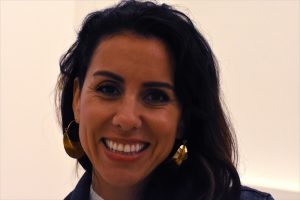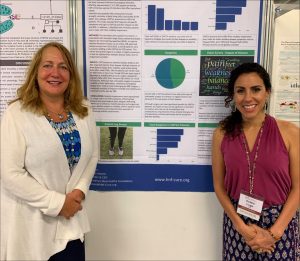HNF’s Estela Lugo Helps Raise Awareness of CMT
Written by |

Estela Lugo, who has CMT, is medical outreach manager of the New York-based HNF. (Photo by Larry Luxner)
Charcot-Marie-Tooth disease (CMT) is one of the most common inherited neuropathies, affecting an estimated 150,000 Americans. But very few people outside the CMT community have ever heard of the illness.
Estela Lugo says that’s partly because of its funny name.
“No one knows what it is, and because the name has no association with any actual symptoms, it’s hard to connect,” said Lugo, who’s lived virtually her entire life with CMT.
The disease — which is incurable but not usually fatal — is named after the three scientists who first described it in 1886: Jean Martin Charcot, Pierre Marie, and Howard Henry Tooth.
Lugo, 39, is medical outreach manager at the Hereditary Neuropathy Foundation (HNF), a nonprofit group dedicated to increasing awareness and accurate diagnosis of CMT, improving patients’ quality of life, and funding research on potential treatments and cures for CMT.
Born in New York of Puerto Rican heritage (her father is from Camuy, and her mother from Mayagüez and San Juan), Lugo was diagnosed with CMT at age 3 after showing signs of drop foot and frequent tripping. Her sister, Melissa, was diagnosed at age 2.
“When I was in kindergarten, I was fitted with braces, and had one surgery, a triple arthrodesis, when I was 12, to correct a foot deformity,” Lugo told Charcot-Marie-Tooth News during a recent interview in midtown Manhattan. “It’s a pretty common surgery for people with CMT.”
Lugo, who lives in Long Island’s Suffolk County, doesn’t take any prescription medications for her disease.
“A lot of CMT patients have pain, but I’m one of the rare patients who don’t experience pain, unless I fall and have an injury,” she said. “I fall, on average, about 65 times a year — but there could be a whole month without falling once, and weeks when I fall multiple times.”
HNF is ‘patient-centered’
The New York-based HNF has eight employees and is based in New York, with satellite offices in Florida, Pennsylvania, Virginia, and Washington state. It operates on an annual budget of $650,000 and has funded more than $2 million in research since its founding in 2001 by CMT patient Allison Moore.
“I did not know I had CMT until my late 20s, when I was diagnosed with a rare cancer,” Moore said in a phone interview. “When they gave me the chemo, I became disabled overnight. It was devastating. I was a runner and a skier, and I didn’t know I was predisposed to this disease.”
In 1997, after recovering from her cancer, she finally got a diagnosis of CMT type 1A, which affects about two-thirds of all CMT patients.
During the first 15 years of existence, HNF charged membership fees. But, Moore said, “as the web started providing free information, it became clear that it was in our best interest to make all our data open-sourced.”
“For a very long time, we’ve been patient-centered and have conducted patient-focused research. That’s where we really stand out as an organization,” said Moore, who was the principal investigator for a $750,000 grant by the Centers for Disease Control & Prevention in 2010 to launch the online CMT Resource Center.
HNF also developed the Therapeutic Research in Accelerated Discovery (TRIAD) as a collaborative effort with academia, government, and the pharmaceutical industry to come up with treatments for CMT. The charity is guided by a 12-member scientific advisory board and belongs to the National Organization for Rare Disorders (NORD).
In 2013, the HNF also established the world’s first patient-focused registry for people with CMT. The Global Registry for Inherited Neuropathies now contains full data on about 3,000 patients, 90% of them in the United States. The organization also has 14,000 likes on its Facebook page.
“Our patient registry has been so instrumental in everything we do. It has enabled us to identify the gaps that are hindering patient care,” Moore said.
Exercise is paramount
CMT generally affects 1 in 2,500 births, though in some countries — particularly Norway — the disease is more common. Experts estimate that about 2.8 million people worldwide have CMT.
“There’s currently no treatment, but hopefully that’s going to change very soon with the drugs now under review at the FDA,” Moore said. “I think it’s important you do the best you can to improve quality of life. Make sure you’re moving, no matter what level of disability you have. You need to stay active.”
That’s because prolonged periods of limited mobility can drastically accelerate symptoms of CMT, according to experts.
Meanwhile, Lugo — who has a 13-year-old daughter and an 11-year-old son — said she has to be very careful where she walks, especially on the crowded streets of New York, which are often full of obstacles.
“My quads are very weak, and my ankle is locked. Whenever there’s an incline or uneven surfaces, it automatically triggers a fall,” she said. “My legs can’t adapt quickly enough to that change, so they’ll give out. That’s why I’m constantly scanning where I’m walking.”
The HNF’s next big event is Nov. 8-9, when it’s expecting 200 people for the Movement is Medicine Summit in Phoenix. Set to take place at the 62,000-square-foot Ability360 Sports & Fitness Center, the summit is billed as “an interactive two-day event with inspirational speakers, expert instructors and informational breakout sessions specifically curated for CMT patients.”
In addition to interactive workshops, the summit also features classroom-style presentations on yoga, meditation, and nutrition. There’s also a full day of adaptive “movement” including vector workouts, functional patterning, aquatics, strength training, and rock climbing.
Orthopedic surgeon Glen Pfeffer and physical therapist Mike Studer will also be available for one-on-one consultations. The summit’s chief sponsors are Acceleron Pharma, Athena Diagnostics, and Pharnext.
For more information on HNF and its activities, visit hnf-cure.org, email [email protected] or call toll-free (855) 435-7268.







